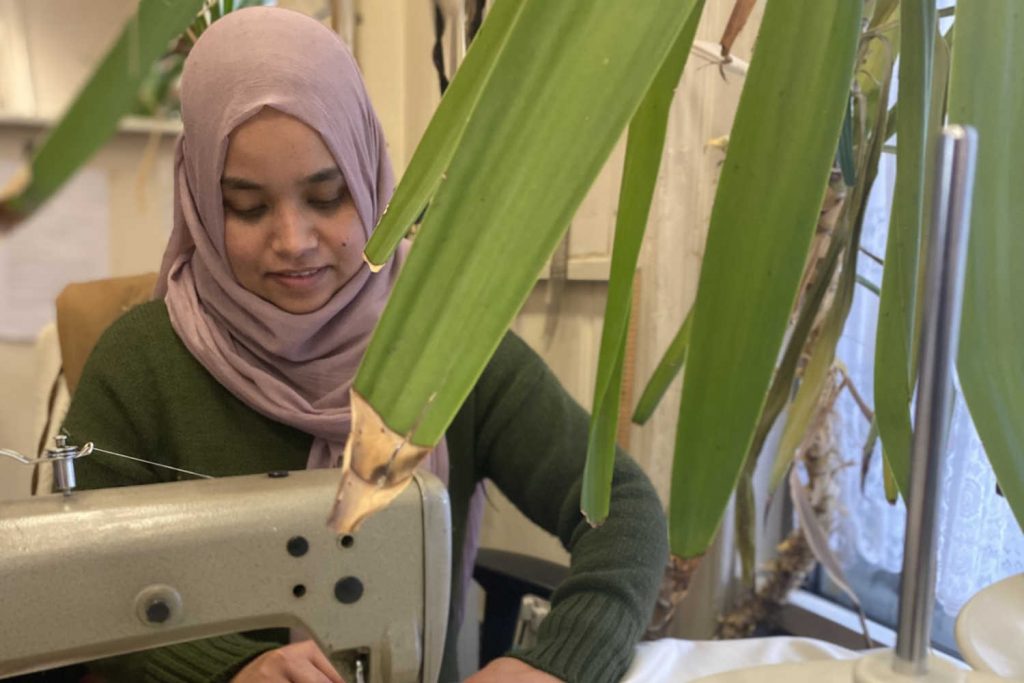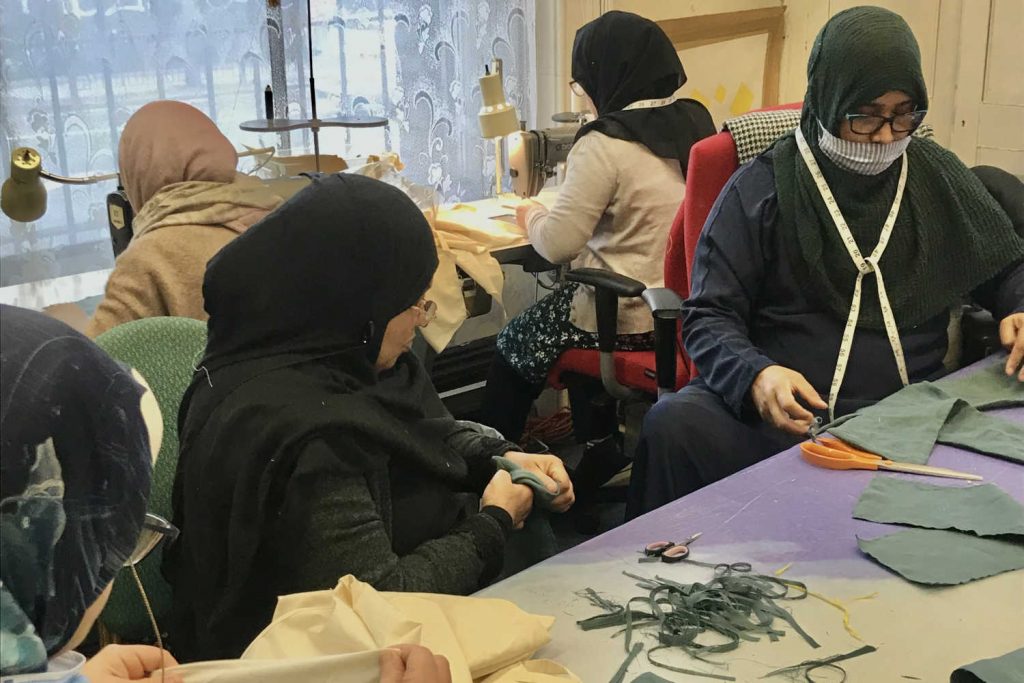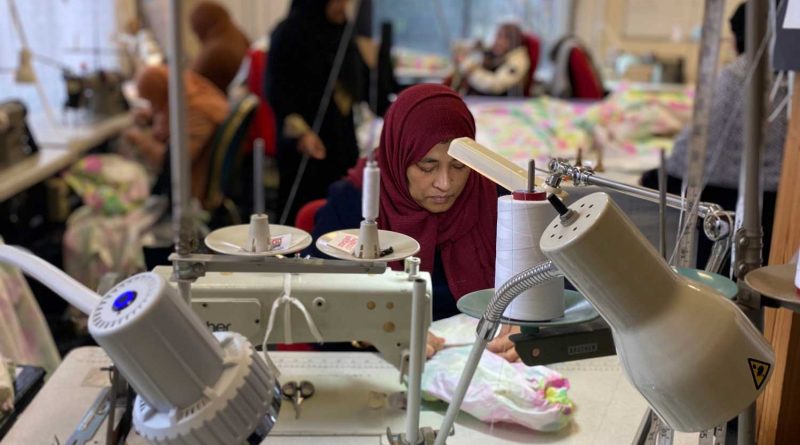Stitches in Time: empowering women with sewing for 30 years
How arts and education charity Stitches in Time and its manufacturing arm FabricWorks are tackling isolation within the community and climate issues in the world from Limehouse Town Hall.
Stitches in Time began as an experiment to see if sewing could start conversations between strangers. This small experiment in 1993 turned into the creation of the organisation’s founding project ‘Tapestry for the Millenium’, consisting of 50 tapestries made by over 3,000 people.
Thirty years later, Stitches in Time is now a participatory arts and education charity with a social enterprise arm based in Limehouse Town Hall in Tower Hamlets and engages with over 2,000 people per year.
Diana England, the founder of Stitches in Time, began ‘Tapestry for the Millenium’ as a community art development project. England’s vision was to create large textile pieces depicting the social and economic history of Tower Hamlets, made by the people who were living there. In the making of these pieces, people were brought together, communities who wouldn’t usually have the opportunity to meet, sew and engage with each other.
This project demonstrated the power of an inclusive space in which people could connect and create. This inspired Stitches in Time to continue providing a creative safe haven that would reach and support isolated groups such as women who are long-term unemployed or have not worked before, some of whom have English as a second language. Their activities create opportunities for those facing marginalisation to gain real experience and learn a trade in a supportive and empowering environment.
‘We are always described as a family, a home away from home’ says Esther Malvern, General Manager at Stitches in Time. ‘It’s a place where they can be with friends and talk to other women, and build up trust to be able to open up about other things or ask for what they need in order to progress.’
Stitches’ success is evident from the many member testimonies on their website, which includes the experience of a FabricWorks participant who states: ‘Stitches in Time has made me independent to come out of the house. I have been suffering from domestic abuse for 29 years. They have listened and helped me and given me emotional support’.
Sewing is the foundation on which Stitches’ work is built upon. It runs a range of projects which include beginner sewing classes, drop-in sewing socials, and pre-ESOL English classes.
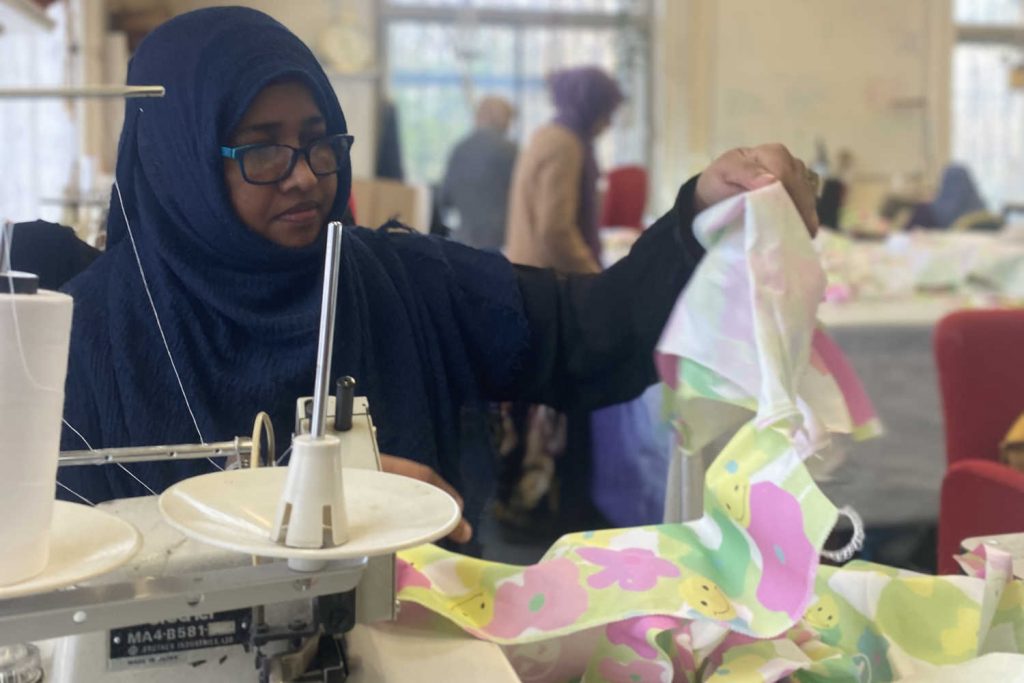
What makes Stitches special is not just what members are being taught, but the way in which they are being taught and what they are being offered beyond practical skills.
‘Being able to come together and make together is a real kind of bonding activity and it means that participants can be involved as much as they want to be.’ says Malvern.
‘There is great pride felt in learning a new skill and showing off that skill to other people and this provides a ripple effect in terms of someone’s confidence and pride in themselves.’
There is great pride felt in learning a new skill and showing off that skill to other people and this provides a ripple effect in terms of someone’s confidence and pride in themselves.
ESTHER MALVERN
Stitches provides members with holistic support. It begins with providing support around sewing and then expands to meet the varied needs of its members, from providing information, advice and guidance appointments to signposting appropriate resources in the borough.
FabricWorks is the training, production, and social enterprise arm of Stitches in Time. It began formally in 2014, matching the need for a London-based textile production service with the need to support employment opportunities for women with an interest in sewing but with little or no work experience.
The FabricWorks team consists of nine full-time makers and four people doing volunteer placements. And they are looking to expand. ‘I am passionate about growing the team and offering more opportunities’, enthused Gracie Sutton, the FabricWorks Enterprise Manager.
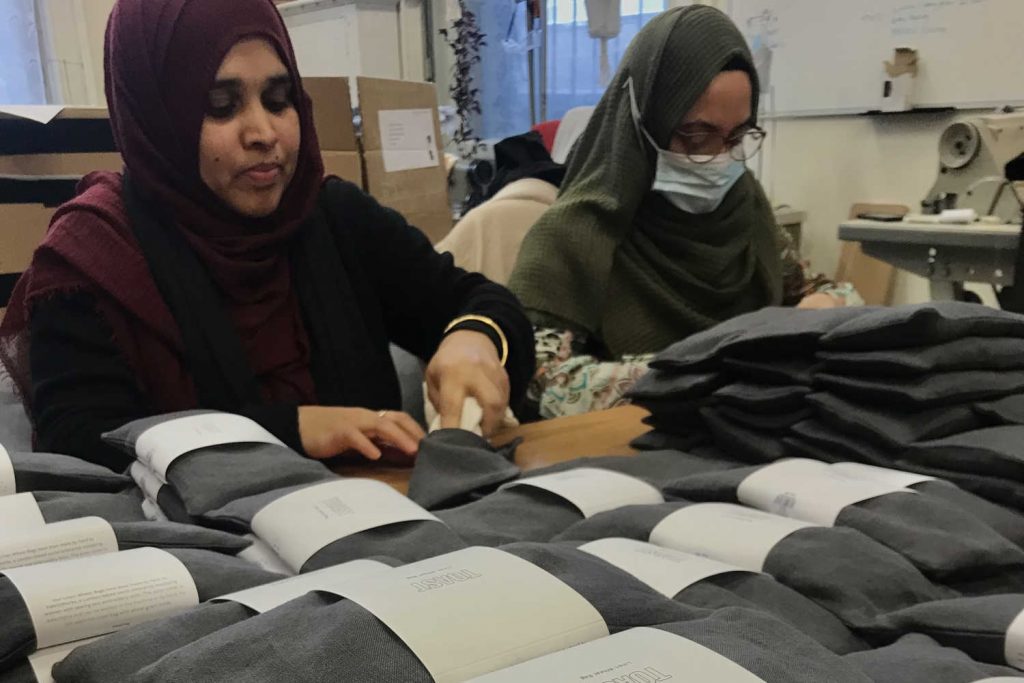
FabricWorks is ethical and sustainable in its employment practices, its services, and in its partnerships. It provides its members with flexible working arrangements and every item produced is costed at the London living wage, agreed with the makers.
As well as manufacturing, FabricWorks offers a mending and alterations service and in doing so it is helping to combat the 350,000 tonnes, around £140 million worth of used but wearable clothing that goes into landfills in the UK every year.
‘We are passionate about sustainability and what that looks like,’ says Sutton, ‘and it’s not always about creating more clothing out there, it is also about repairing what you have and we were keen to offer that as a service to mend, up-cycle and bring new pieces to life.’
Sustainability is not always about creating more clothing out there, it is also about repairing what you have and we were keen to offer that as a service to mend, up-cycle and bring new pieces to life.
GRACE SUTTON
‘We want to spread the message that the most sustainable garment is the one that is already in your wardrobe, and that it’s cheaper to fix a garment you already have than buy something new. We know that changing the general public’s mindset will not happen overnight but it’s about encouraging more people to mend and alter’ said Sutton.
FabricWorks takes commissions from artists, designers, and brands. In selecting its commissions, FabricWorks prides itself on only working with brands that share the same ethics and morals.
A false reality has been created by some manufacturers that you can have very cheaply made products in a short amount of time without sacrificing working and production standards, so FabricWorks agree on production times and costs at the outset. ‘If a commission didn’t understand all those things, then we wouldn’t take on the commission,’ said Malvern.
The close partnership formed with brands allows FabricWorks to help their partners understand the production processes and how they can limit the waste of their fabrics. ‘We work closely with our brands to rework their scraps to create other projects, so they don’t end up in landfills,’ said Sutton.
These additional projects are also a great way for FabricWorks makers to use their other skills apart from sewing such as hand embroidery. ‘We want to give them an opportunity to use those additional skills in a way that is sustainable and showcases them,’ said Sutton.
The high standards to which the FabricWorks team operates is exemplified by one of Sutton’s favourite commissions, the creation of wheat bags for the brand TOAST. This commission took several months to complete, it provided work for 20 women and the experience of working with the team at TOAST was enjoyed by all.
When a commission is received and women get to work in the East London Studio both Malvern and Sutton agree that the atmosphere is amazing with women’s energy bouncing off one another.
‘It’s not just about earning money, it is about the sisterhood and confidence that comes with it ‘ said Malvern.
Going forward Stitches in Time and FabricWorks aim to expand their existing projects, so they are able to provide much-needed support and employment opportunities to more women. ‘I think we are going in the right direction for that, and we need to keep doing what we are doing,’ said Sutton.
